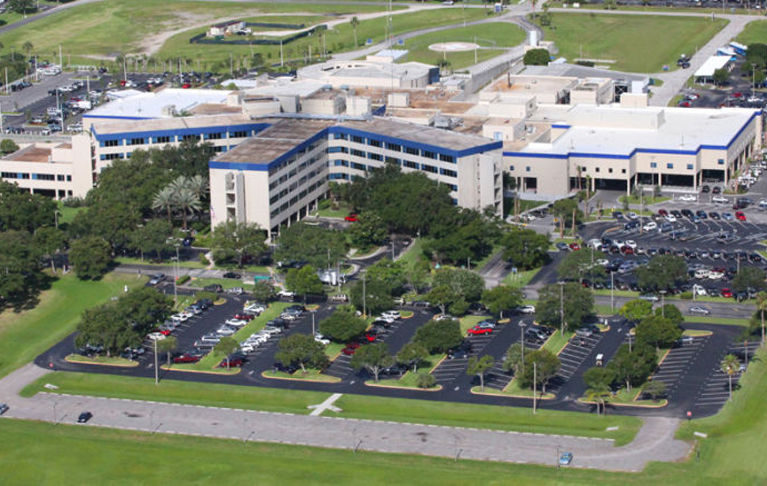
The majority of Hospital District trustees expressed either shock or dismay last week after learning that the Indian River Medical Center, its CEO Jeff Susi and its COO Steve Salyer had quietly settled a federal non-compete lawsuit after Salyer was hired away from Sebastian River Medical Center.
District trustees, who direct millions of taxpayer dollars to the hospital, and a few hospital board members said they first learned of the suit when they read about it in Vero Beach 32963 in late October, after the suit had already been settled for an undisclosed amount.
“Did the hospital and its advisors never think that this would come out in the public domain?” asked District chairman Tom Spackman.
At a Tuesday meeting last week, several District trustees not only questioned the hospital’s secrecy after repeated promises to the District to be more transparent and communicate better. They questioned whether the hospital had behaved ethically when it hired Salyer, who had non-compete, no-solicitation of employees and no sharing of trade secrets clauses in his contract with Sebastian, where he was Chief Executive Officer three weeks before coming 15 miles down the road to Indian River hospital.
“I am very upset. The trust we have been trying to build with the hospital has been totally blown away,” said District Trustee Michael Weiss.
Weiss also questioned the business ethics of hospital leadership in hiring Salyer despite his non-compete clause. The hospital has offered to let CEO Susi and the hospital’s outside lawyer answer questions about the suit if District trustees would sign a nondisclosure agreement about what they were told, but Weiss said he had ethical problems with that offer, too.
While insistence on a signed nondisclosure agreement was rescinded after a few District trustees objected to it, Weiss still called the original offer “a gross violation of the Sunshine Laws.”
District Trustee Gene Feinour said he saw the lawsuit as “a total breakdown of communications between the hospital and the District” and said he had questions about “the hiring (of Salyer) and the follow-up.”
The hospital can only “exist with taxpayer support and philanthropy, and this can cause real damage to that process,” he said.
District trustee Marybeth Cunningham called the lack of communication from the hospital about the suit “disheartening” and “a breakdown of trust.”
“It should have been reviewed by the hospital legal staff,” she said, referring to the need to vet whether Salyer’s non-compete clause was enforceable.
Depositions in the lawsuit show that hospital CEO Jeff Susi, then-hospital board chairman Tom Segura and hospital board member Kathy Hendrix, along with hospital general counsel Val Larcombe and current hospital board chairman Wayne Hockmeyer, knew about the non-compete clause in Salyer’s contract before he was hired, but didn’t think it was enforceable (based on what Salyer said a businessman told him) and saw no reason to look into it.
District board chairman Tom Spackman told the trustees that he had reviewed documents in the case and believed they raised “serious questions about competence and integrity” at the hospital.
He called upon the hospital board of directors to become better informed about the case, encouraging them to “review the documents.”
New trustee Ann Marie McCrystal said she was all for communication between the hospital and the District, and would like to be assured that the taxpayers are not having “to bear the burden” of paying for anything in the settlement. But she said she took issue with accusations that some of the hospital leadership had not behaved ethically because the accusations could “damage somebody’s reputation.”
District trustee Allan Jones said that he couldn’t say that IRMC’s hiring of Salyer was “a clear breach of ethics.” But the hospital’s decision “to play its cards so close to its vest is unfortunate.
“It’s a breakdown of what we agreed to … and I’m disturbed by what I’ve seen,” said Jones.
New District Trustee Val Zudans said he didn’t know if Indian River Medical Center had received proprietary information from Sebastian in violation of Salyer’s contract. But, if that happened, he said District trustees “should hold them accountable.”
“The hospital is not financially viable without (money from) the hospital foundation and the District, and, if that’s true, they should have more say,” he said.
Susi, who attended the District discussion with one of the lawyers in the case, stood up at one point and said he had a “confession” to make: “We should have communicated this and I apologize. I should also apologize to a couple of board members (who weren’t told of the suit),” he said.
The financial settlement of the suit would have “no impact on the taxpayers and indigent care,” he told District trustees and the three hospital board members at the meeting.
Susi also gave two examples of situations to show that Indian River Medical Center had not been party to using trade secrets from Sebastian. But the examples he gave were among the weaker elements of the evidence on sharing trade secrets, and he did not address stronger evidence on the topic.
At one point in the meeting, Weiss asked: “How many times do we have to come to this situation?” Adding: “Time and again there are shady facts, (with the hospital) trying to hide things.”



